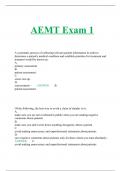P8- Suggest services within the health and social care sector that can best support the needs of
individuals with long-term physiological conditions
There are many services that can be offered to people with multiple sclerosis. The first point of
contact for someone who is experiencing their first symptoms of multiple sclerosis would be their GP
to then get them referred to a specialist in neurological conditions. Depending on how the condition
affects them will impact which care practioner are required to offer support to them. A GP only has
general knowledge of multiple sclerosis, so this is why the individual would need to be referred to a
specialist. General practitioner surgeries are most likely to be the primary point of contact in which
an individual seeks support for symptoms they have. A long-term relationship between the doctor
and patient may have previously established, which is beneficial for both individuals. A medical
history of the patient will be taken if it has not been done before, followed by a questioning of the
symptoms. After the questions the GP will likely have an idea of what the condition could be, and
this may be followed with a physical examination. The GP would then make the decision whether
the individual will require a referral to a specialist or not. GP’s are increasingly joining together with
health centres to offer better facilities and extra services. Facilities might include specialised clinics.
Services such as this will relieve the pressure on hospitals, prevent service users from potentially
travelling long distances for care and provide quality care for the local community. Health centres
are often near pharmacies, which make it accessible for people to get their medication. Individuals
who require hospital treatment may enter as in-patient or out-patients. Individuals with serious
conditions such as multiple sclerosis, particularly if symptoms are severe will be given access
immediately so treatment and further investigations may occur. When a condition is considered less
severe patients may wait longer periods of time. Hospitals have a variety of facilities on site, but
some patients may occasionally need a transfer to another hospital for specialist facilities. Smaller
hospitals with limited facilities may be visited by a specialist consultant on pre-arranged dates. The
majority of ill individuals would prefer to remain within their own home whilst receiving care,
especially so if they have caring family members living with them. The older population often have a
fear of residential care or hospitals and would prefer to remain at home, as they may have a fear of
dying in hospital instead of their own home with their family and their personal belongings. As
individuals experience muscle weakness and spasms, they may be referred to a physiotherapist. A
physiotherapist is able to put in an exercise plan for the individual, and these exercises can be
specific to the joints affected, and the symptoms experienced by the individual. For example, if
someone experiences bladder weakness then they may be given exercises to strengthen their pelvic
floor. Another point of contact for bladder and continence issues is a urologist. They work in
hospitals, and can provide treatments such as Botox to manage bladder problems. Pharmacists are
there to offer support when it comes to prescription and non-prescription medicines, and they can
also advise of the side effects of medicines and what to do if you get these side effects.
, There are many services that can be offered to people with down syndrome. The first point of
contact for them would be their GP, if they are experiencing difficulties that may be related to their
condition. Someone with down’s syndrome may have delayed speech and language, difficulty in
using language, impaired speech, and difficulty understanding written information. In this case, they
would be offered support from a speech and language therapist. This can be offered to them if they
are experiencing delayed language, or have difficulty in forming sentences, and often rely on fillers
to take up time as they try to remember a word. Down syndrome is also a learning disability and
individuals with learning disabilities often experience higher levels of ill health and they also have
more complex medical needs compared to others in society, so often need more support than
others. They can experience nutritional disorders more easily than what others can, so they may
require support from a nutritionist or dietician, to identify what nutritional disorders they are
suffering from and to form a nutritional plan, in order to manage any nutritional disorders, they are
experiencing.
P9- Explain the purpose of local service provision for people with long term physiological
conditions
The purpose of local service provision is to offer support to people suffering from long term
physiological conditions. Statutory care provisions are a type of care that is required by law and
governed by the legislation. Local and health authorities like the NHS are all subject to the laws in
delivering services and meeting targets that are set, the targets are set so that the people in the
country follow them. The care provision is to last until the patient has left the hospital and is healthy
enough so that they don’t need help anymore. Primary care is given by a GP, they are the first point
of contact for concerns, apart from A&E cases. They give a diagnosis and treatment or can do a
referral to a specialist if this is what is needed.
Hospital trusts have a duty to provide secondary care, meaning individuals must have a referral to
there from their GP.
Commissioning groups were introduced by the Health and Social Care Act 2012. They aim to meet
local needs. They are GP- led bodies that commission most health services. Commissioning is the
process of planning, contracting and purchasing specific health and social care services required by a
local area.











